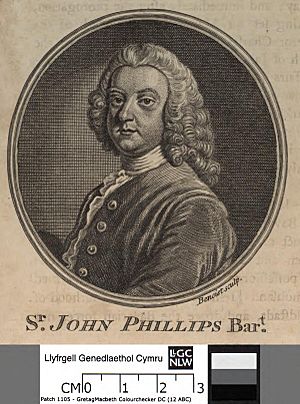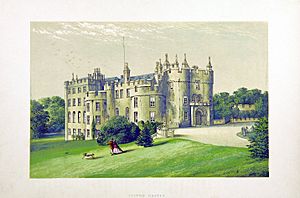Sir John Philipps, 4th Baronet facts for kids
Sir John Philipps (born around 1666 – died January 5, 1737) was an important Welsh landowner and politician. He lived at Picton Castle in Pembrokeshire, Wales. Sir John was a member of the English House of Commons from 1696 to 1703 and later the British House of Commons from 1718 to 1722. He was also a kind person who gave money and time to good causes (a philanthropist). He played a big role in improving education and religion during his time.
Contents
Early Life and Family
John Philipps was the oldest son of Sir Erasmus Philipps, 3rd Baronet. His mother was Catherine Darcy. He went to Westminster School and then studied at Trinity College, Cambridge starting in 1682. He became a scholar there in 1683.
When his father passed away on January 18, 1697, John inherited his title and became Sir John Philipps, 4th Baronet. He married Mary Smith in December 1697. Mary's father, Anthony Smith, was a merchant who traded with India.
A Career in Parliament
Sir John Philipps was first elected to Parliament in 1695. He represented the area of Pembroke Boroughs without anyone running against him. He came from a family that believed in religious freedom (nonconformist background).
In Parliament, Sir John spent a lot of time working on laws to stop bad behavior like gambling and other immoral acts. In 1697, he took over his father's role as the main record keeper for Pembrokeshire. He was re-elected for Pembroke Boroughs in 1698 and again in 1701.
Why did he leave Parliament?
Sir John decided not to run for election in 1702. He wanted to spend more of his time on religious and charitable work. However, he returned to Parliament later. In 1718, he was elected as the Member of Parliament for Haverfordwest. He stopped being an MP in 1722 because his eyesight was getting poor.
Helping Others and Education
Sir John Philipps was a very important member of the Society for Promoting Christian Knowledge (SPCK). This group worked to spread Christian education. He was a key supporter of the charity school movement in Wales. These schools helped poor children get an education.
He also supported important religious leaders like George Whitfield and was friends with John Wesley. He helped Griffith Jones, who later married one of his daughters. Sir John also helped fund two new editions of the Welsh Bible, making it easier for people in Wales to read the Bible in their own language.
In 1730, he helped raise money for Polish Protestants who were facing difficult times because of their religion.
His Final Years
Sir John Philipps passed away suddenly on January 5, 1737, while at his home in London. He was buried on January 28, 1737, at St Mary's Church in Haverfordwest. His tombstone says that he always aimed to encourage good behavior and religious faith.
He had three sons and four daughters, but three of his children died before him. His oldest son, Erasmus, took over his title. Two of Sir John's sons also became members of Parliament, following in their father's footsteps.
 | Aaron Henry |
 | T. R. M. Howard |
 | Jesse Jackson |



